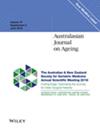Developing a dementia care and support needs framework for Culturally and Linguistically Diverse populations: A whole-of-community co-design approach
Abstract
Objectives
Older individuals with dementia and their families from CALD backgrounds face a ‘triple jeopardy’ due to the combination of dementia, caregiving challenges and cultural stigma. Despite the growing need for culturally responsive dementia care, existing services do not adequately address the specific concerns of Culturally and Linguistically Diverse (CALD) communities. This study explored the experiences of two CALD communities to inform the development of a culturally tailored dementia care support framework.
Methods
This study employed a whole-of-community co-design approach, integrating community-based participatory research and human-centred design principles. A total of 36 participants, including nine individuals with dementia and 27 family caregivers from the Macedonian and Italian communities in the Illawarra Shoalhaven region of NSW, Australia, collaborated with ADHERe researchers and the Multicultural Health Service. Data were collected through co-designed focus groups and interviews and analysed using thematic analysis. Participant feedback was regularly incorporated to ensure the framework reflected their lived experiences and needs.
Results
Key barriers to dementia care included emotional and psychological strain contributing to caregiver burden, social isolation limiting peer support, language difficulties hindering communication with health-care providers and cultural misunderstanding impacting service uptake. Participants emphasised the importance of face-to-face interactions, culturally relevant educational programs and practical guidance from health-care professionals to improve dementia care and support.
Conclusion
This study highlighted the need for a culturally tailored, community-driven dementia care framework. Piloting a dementia education program with the Macedonian and Italian communities will provide valuable insights for expanding support to other CALD groups, promoting more inclusive and accessible dementia care.


 求助内容:
求助内容: 应助结果提醒方式:
应助结果提醒方式:


